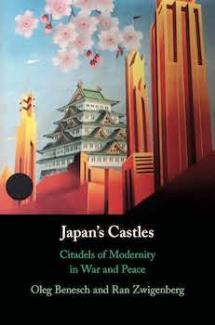Event

[Please be advised this event has been cancelled and postponed to a later date TBD]
Japan's Castles: Citadels of Modernity in War and Peace
Oleg Benesch (University of York) and Ran Zwigenberg (Penn State) in conversation with Nathan Hopson (Nagoya University)
Abstract:
Nathan Hopson of the New Books Network podcast discusses a recent monograph on the history of Japan’s castles with authors Oleg Benesch and Ran Zwigenberg. Castles are some of Japan’s most iconic structures and have become prominent symbols of local, regional, and national identity. Contemporary celebrations of castles, however, obscure the troubled modern history of abandonment, dismantlement, and destruction before reinvention as physical links to an idealized martial past. From the turn of the twentieth century to the present, castles contributed both symbolically and physically to the militarization of Japanese society. Castles were at the center of national transition after 1945. Shorn of their overt militarism, they became symbols of local and regional identity, linking these to a “safe” premodern past by obscuring problematic aspects of imperial modernity. Japan's Castles helps rethink narratives of continuity and change in modern Japan, examining the changing role of castles in Japan’s troubled politics of history.
Oleg Benesch is Senior Lecturer in East Asian History at the University of York, specializing in the transnational history of early modern and modern Japan and China in global perspective. His recent publications include the book Inventing the Way of the Samurai: Nationalism, Internationalism, and Bushido in Modern Japan (Oxford, 2014). For more information on Oleg and his research, please go to his website.
Ran Zwigenberg is Assistant Professor at Pennsylvania State University. His research focuses on modern Japanese and European history, with a specialization in memory and intellectual history. He has published on issues of war memory, atomic energy, psychiatry, and survivor politics. Zwigenberg’s monographs include Hiroshima: The Origins of Global Memory Culture (Cambridge, 2014), winner of the 2016 Association for Asian Studies’ John W. Hall book award. For more information on this and other projects, please see this page.
Nathan Hopson is Associate Professor of Japanese and East Asian history at Nagoya University, Japan. His first book, Ennobling Japan’s Savage Northeast: Tōhoku as Postwar Thought, 1945-2011 (Harvard University Asia Center, 2017) treats the place of Tōhoku (northeast Honshu) in modern Japanese national history. He is currently researching the history of school lunches in Japan and their relationship to the development and application of nutrition science as a technology of national strengthening, focusing on the history of governmental “nutritional activism” and the school lunch program, 1920-present.